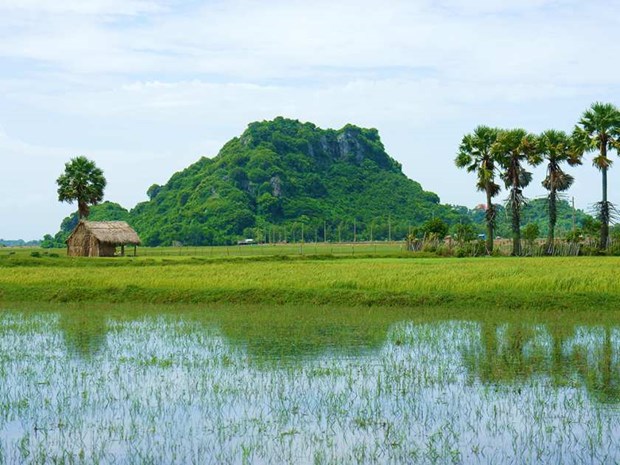
Last year, Vietnam attracted more than 10 million tourists, in part because of its incredible food and unique vistas, such as this view along the Mekong Delta.
The
scenes of rural life are straight out of picture books sights rivalled only, we
discover, by the transporting tastes Vietnam has to offer.
When
the heat hits its height, we shelter at a roadside café, gulp iced glasses of nuoc mia, fresh-pressed sugarcane and
kumquat juice, and gorge on fruit ruby-red water apples, Asian pears and
tangerines dipped in fiery salt seasoning. As we work up the energy to push on
to the Delta outpost of Ben Tre, we ask our guide, Nguyen Manh Hai, about his
life here before Vietnam opened up to the West as a foodie tourist paradise.
It
was, Hai tells us, anything but idyllic. As a 10-year-old growing up outside
Can Tho in the 1970s, he used to get down on his knees in his family’s rice
paddy and pray for food. It was Hai’s job to go out each day and hunt enough
fish or frogs to help feed his parents and six siblings.
These
were the lean years of the nation’s postwar recovery between 1975 and 1986.
Only after did the Communist government begin economic and political reforms to
gradually improve the economy and reduce isolation. The process bore fruit in
1995 when the U.S. normalized relations and international tourism began to
grow. That year, just over a million foreigners visited; last year Vietnam
attracted more than 10 million tourists, lured by the country’s stunning
scenery, affordability, and incredible food.
That
influx means that today, Hai and others now make a living helping visitors
discover the region’s welcoming people and abundant cuisine.
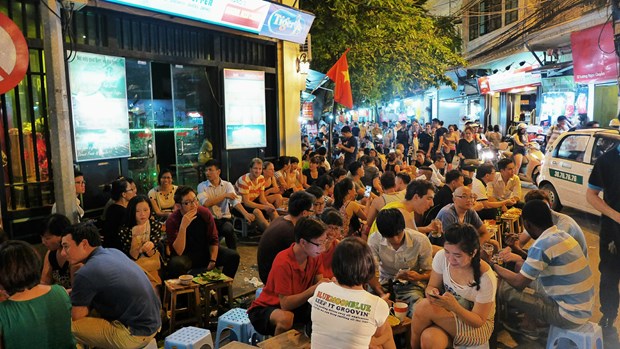
Eating on plastic chairs set up on the sidewalk is common in Hanoi, known for its fantastic street food.
While
Hai is an ardent advocate of Vietnam eats and experiences, he’s far from the
only one. Last year, when former U.S. President Barack Obama made his first
trip to Vietnam to visit President Tran Dai Quang, he made a surprise stop at a
humble restaurant in Hanoi’s French Quarter. There, he sat on a plastic chair
clinking bottled local beer with celebrity chef and TV host Anthony Bourdain.
When the episode aired on Bourdain’s
Parts Unknown last May, it was a watershed moment for Vietnamese food and
tourism. Here was a sitting president, eating no, slurping! local peasant food,
and loving every spoonful.
The
unlikely pair dined at Bun Cha Huong Lien, a local joint know for bun cha, a
soup with a smoky broth and honey sweetness, with juicy barbecue minced pork
patties, soft white rice noodles and butter lettuce, cilantro and herb
garnishes. Per Obama: “That’s good stuff.” The presidential dinner came to six
dollars.
Bourdain
is Vietnam’s unofficial international tour guide, professing his love for the
country and its cuisine since the early 2000s. It’s working. One hip New York
couple we meet in Hanoi sum up their travel plans in two words: “Anthony
Bourdain.” But aside from celebrity endorsement, the true beauty of Vietnam is
that the produce is so exceptional, the standards of cleanliness so high and
the street food so sensational, anyone can afford a culinary adventure.
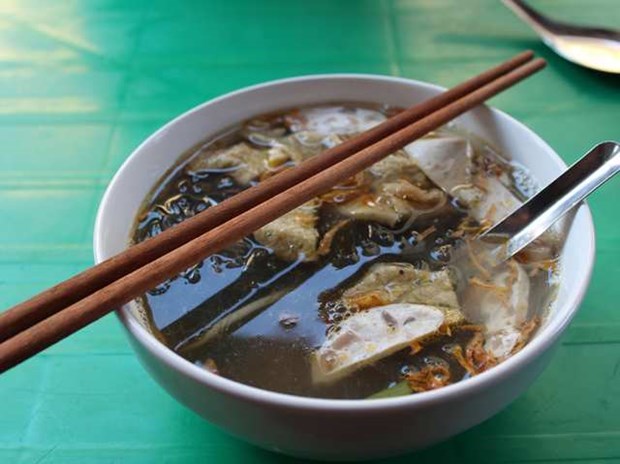
Mystery soup with glass noodles, morning glory greens, pate slivers and pork cracklings.
In
the spirit of Bourdain our motto for our two-week foodie tour of Vietnam is: go
beyond pho. And as we finish our Mekong ride to Ben Tre and putter up the Song
Ham Luong river’s water-palm lined canals in search of a meal, we’re
deliciously off-book.
When
we land at a rustic homestay called Mai’s House, we’re welcomed to an outdoor
table laden with steaming sup nui ga,
a delicate chicken vegetable soup, crisp cha
gio fried spring rolls, fresh goi
cuon rice rolls and a whole cooked catfish, which we flake and roll in rice
paper with mint and cilantro, before dunking in nuoc mam fish sauce Vietnam’s version of ketchup. Cam on, we murmur in thanks at each new
course, until we can eat no more.
After
lunch, we relax by the river drinking cafe
sua da, sweet Vietnamese coffee and listen to the sounds of the Mekong,
which, improbably, are the sounds of bird calls mingled with karaoke parties
blaring from the jungle.
While
the mysteries of the Mekong are an undisputed draw, for those lured by
Bourdain’s superlatives, Hanoi is ground zero.
In
the northern capital of more than seven million people and five million
motorcycles, concrete towers coexist with twisted banyans, smart boutiques with
sidewalk bia hoi joints serving 40-cent beer flutes to the strains of “Mot hai ba, yo!” raucous drinking
toasts.
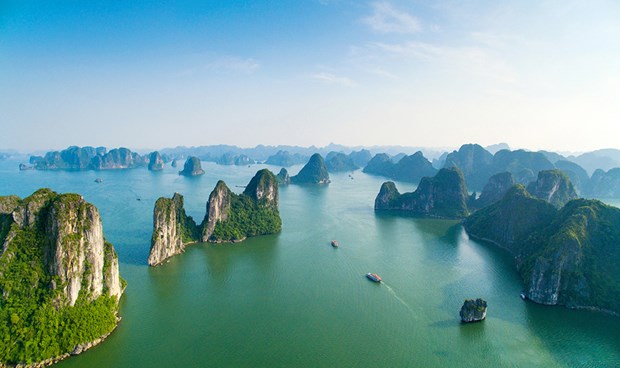
Not to be missed is an overnight sail amid the majestic karst cliffs of Ha Long Bay to wander through caves, kayak around islands, and eat fresh-caught squid.
There
is much to recommend Hanoi strolls around leafy Hoan Kiem Lake with its
charming island temple Ngoc Son, views of the city’s stunning thousand-year
anniversary mural, and outings to dozens of temples, markets and museums,
including the Ho Chi Minh Mausoleum but it’s the city’s food culture that marks
it as extraordinary.
We’ve
discovered this on aimless walks through the chaotic and colourful Old Quarter.
Street food is everywhere grilled pineapple with chili salt, spicy banh mi thit xien nuong baguettes
bursting with barbecue pork, pickled cucumbers and cilantro, and warm banh xeo rice crepes studded with
shrimp, pork and sprouts and everything is delicious.
Hop
on a cyclo on a street food tour (or take your life in your own hands and rent
your own) and become one with the river of traffic flowing over Long Bien
Bridge the most bombed and rebuilt span in the world. Cruise around scenic Ho
Tay (West Lake) to take in the sunset from the Tran Vu Pagoda, but be sure to
stop along the way at street vendors offering bo bia, a sweet sugarcane snack dusted with coconut and folded into
a crispy rice rolls, and kem,
Vietnamese ice cream in exotic flavours such as green rice and taro.
Then
follow in a former president’s footsteps and head to the French Quarter to Bun
Cha Huong Lien, still packed with locals ordering bowls from owner Nguyen Thi
Lien, who has now adorned every wall with pictures of Obama and a new English
menu boasting the “Combo Obama.” And while, once Bourdained, it’s no longer a
hidden gem, the meal is still magical, and we discover charcoal-sweet bun cha
blows pho — even authentic anise-laced pho
ga — out of the bowl.
Wherever
we roam, we’re repeatedly floored by Vietnam’s friendliness and flavours. Not
to be missed is an overnight sail amid the majestic karst cliffs of Halong Bay
where we wander through caves, kayak around islands, explore beaches, practice
tai chi at dawn and dine on fresh squid in tart green mango salad and fruit
plates featuring dragonfruit, mangosteen and lychees.
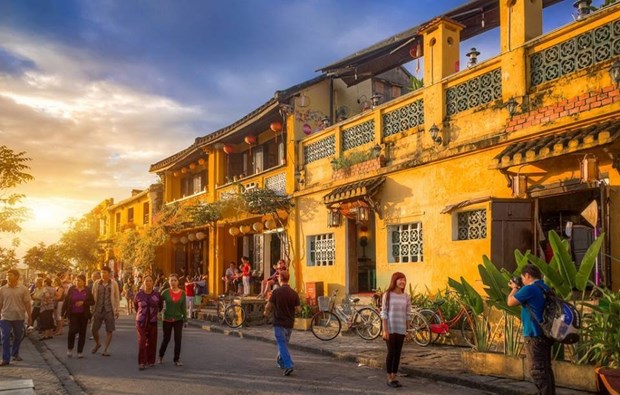
Take in the UNESCO heritage charm of coastal Hoi An.
Equally
appealing is the UNESCO heritage charm of coastal Hoi An with lantern-lit lanes
dotted with cooking schools and French cafés, silk shops and spas, tailors and
temples, beaches and bars. Here, we sample Hoi An specialties such as banh boa
steamed shrimp dumplings and cao lau,
a dry pork noodle dish, then track down what Bourdain claims is the best banh
mi in the country care of Phuong Banh Mi
a tiny food stall outside Cho Hoi An market. Once you’ve had one, it’s hard to
argue. Phuong’s banh mi deluxe is a warm
buttered baguette bursting with roasted chicken and pork, pate and soft egg,
gravy and mayonnaise, paper thin cucumbers, tomatoes and onions, pickled
carrots, cilantro and mint, nuoc mam
and hot sauce. It’s heaven for 25,000 Vietnamese dong $1.45 Canadian.
Head
south and dive in to cosmopolitan Saigon (Ho Chi Minh City) and spend a day
straddling old and new: touring designer malls and wet markets, incense
wreathed pagodas and grand opera houses, peaceful botanical gardens and brutal
war museums before plunging into the nightlife, bar hopping in search of a sip
of Vietnamese homebrew ruou. Get to
sleep early enough to enjoy day trips to the countryside, either exploring the
famed Cu Chi war tunnels or biking the Mekong to taste simple rural cooking
with locals like Hai.
One
afternoon back in Hanoi’s Old Quarter, hungry and disoriented, we’re ready to
take risks on choose-your-own-adventure dining. We follow our noses to a woman
squatting on the curb stirring a steaming pot of something unrecognizable. We
sit, gesture, and wait. Our bowls boast a light broth, glass noodles, morning
glory greens, translucent pate slivers and a nest of pork cracklings. We’re
dining blind, exploring as our own guides, and thrilled with every bite.
Bourdain would be proud.
By Elaine
O'connor/Postmedia News